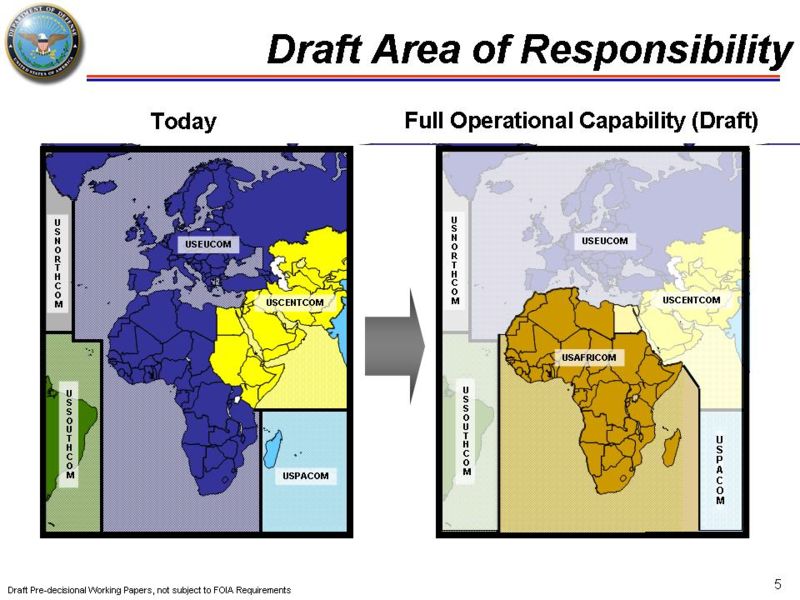Az 1973-as olajválság folytán nyilvánvalóvá vált a nyugati országok olaj-függősége. Közben tart a hidegháború, a Szovjetunió önellátó az olaj tekintetében. Az ekkoriban készült tanulmányok arra a kellemetlen tényre világítottak rá, hogy bár az amerikai haditengerészet és tengerészgyalogság igen meggyőző kapacitásokkal rendelkezik, mégsem áll elég forrás a rendelkezésükre (a NATO szövetségesekkel együtt sem), hogy gyorsan beavatkozzanak az olaj-szállítások esetleges akadályoztatása esetén.
1977-ben Jimmy Carter közvetlen utasítására elkezdték különböző integrált, gyorsreagálású egységek létrehozásának tervezését. A haderőnemek közti rivalizálással tarkított folyamat az évtized végéig tartott, majd létrejött a Joint Rapid Deployment Task Force, rövidebb nevén: Rapid Deployment Force (RDF). Reagen elnöksége alatt az RDF-et átszervezték (1983) és így lett belőle Central Command (Centcom), 19 ország tartozott az illetékességi területébe Kenyától kezdve a Perzsa-öblön át egészen Pakisztánig. (Mind az első, mind a második iraki háború levzénylése a Centcom-hoz kapcsolódik). A Centcom-on kívűl az alábbi parancsnokságokat hozták létre:
- Northern Command (Észak-Amerika), létrehozva: 2002
- Southern Command (Latin-Amrika)
- Pacific Command, elődszervezet létrehozva: 1947
- European Command, elődszervezet létrehozva: 1952
Az amerikai elnök 2007. február 7-én jelentette be az AFRICOM megalapítását, a teljes struktúra létrehozásának határideje 2008 vége. A végleges elhelyezésig Stuttgartban lesz a székhely. Az Africom létrehzásánál a biztonsági és katonai szempontok domináltak az emberi jogok védelmével szemben. A három fő ok:
- nyersanyag-ellátás biztosítása
- terrorizmus elleni harc
- Kína afrikai befolyásának növekedése
A kínai jelenlét elmúlt évekbeli erősödése csak az egyik elem. Jelenleg sokkal fontosabb, hogy az afrikai államok jó része számos folyamatosan belső konfliktussal küzködik.
Az AFRICOM illetékessége
A kép forrása.
Ajánlott cikkek:
James J.F. Forest: Strategic Implications of AFRICOM
And yet, the U.S. is strengthening its economic ties with many countries in Africa. Major U.S. trading partners in Africa include Algeria, Angola, Egypt, Nigeria, and South Africa. Our economic interests are particularly strong toward African states with considerable wealth in natural resources, including oil, natural gas, and minerals. Africa (especially in the central and southern states) produces between one-quarter and two-thirds of many of the world’s essential minerals, such as chromium, cobalt, diamonds, manganese, platinum and vanadium. Security in oil-rich states helps ensure a stable supply of oil to the markets, while insecurity has the opposite effect, which translates into volatile oil markets and rising oil prices.
Today, nearly 18 percent of U.S. oil imports come from sub-Saharan Africa—almost as much as from Saudi Arabia. According to projections by the National Intelligence Council, that proportion will likely reach 25 percent by 2015. As described in a recent book published by Lexington Press, (Oil and Terrorism in the New Gulf, 2006), the vast majority of it will come from a stretch of West Africa’s coastline between Nigeria and Angola called the Gulf of Guinea, where an estimated 50 billion barrels of oil reserves are located. Already, Nigeria is the fifth largest supplier of U.S. oil, Angola is the ninth largest, and countries such as Equatorial Guinea, Gabon, and the Republic of Congo are becoming increasingly important to U.S. energy security interests. Another 50 billion barrels of reserves are located in Algeria and Libya—two countries with which the U.S. is forging stronger bilateral ties. Threats to the stability of our important trading partners impact the U.S. economy, and by extension, its security.
Paul Rogers: The US and Africa: eyes on the prize
All this raises the prospect of more intensive economic and political competition between the United States and China, rather than the risk of open conflict. The establishment of Centcom, however, raises the expectation of a shift in the nature of the US's bonds with a number of African countries - towards a situation where policy towards Africa is mediated through military relationships fostered by the Pentagon, with all its financial resources rather than through the much more constrained state department and its operation of (for example) Usaid development programs.
Paul McLeary : A Different Kind of Great Game
Given their competing approaches to the continent—the humanitarian and military approach favored by the United States, and the purely economic policy favored by China—it’s clear that Africa will be the scene of some major disagreements between the two powers. The United States’ uneven track record in the war on terror doesn’t inspire much confidence, but the fact that Africa will no longer be split among several military commands is cause for some hope. It remains to be seen, however, if African regimes prefer the quick investment that China is willing to provide, or the less tangible, longer-term health and stability that the United States is promising.



Ajánlott bejegyzések:
A bejegyzés trackback címe:
Kommentek:
A hozzászólások a vonatkozó jogszabályok értelmében felhasználói tartalomnak minősülnek, értük a szolgáltatás technikai üzemeltetője semmilyen felelősséget nem vállal, azokat nem ellenőrzi. Kifogás esetén forduljon a blog szerkesztőjéhez. Részletek a Felhasználási feltételekben és az adatvédelmi tájékoztatóban.